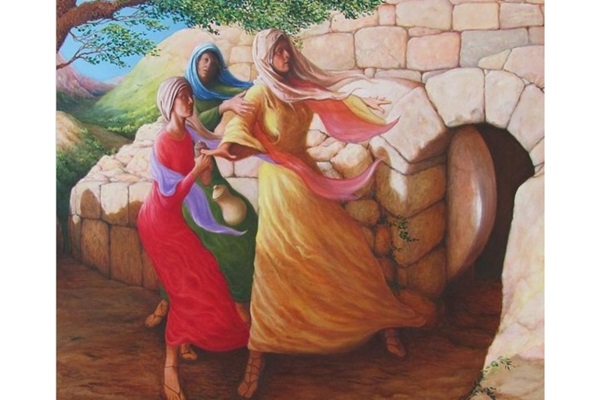Final in a series of devotions for Holy Week written by United Methodist pastors.
Scripture: Mark 15:47-16:3 (CEB)
Artist: Herschel Pollard
Herschel Pollard is a former staff member of the Television Radio and Film Commission of the Methodist Church, a predecessor agency to United Methodist Communications.
Mary Magdalene and Mary the mother of Jesus saw where he was buried.
When the Sabbath was over, Mary Magdalene, Mary the mother of James, and Salome bought spices so that they could go and anoint Jesus’ dead body. Very early on the first day of the week, just after sunrise, they came to the tomb. They were saying to each other, “Who’s going to roll the stone away from the entrance for us?”
Devotion
There is a tradition in African American communities called tarrying. It is when friends, family, and church family gather around the body of someone who is sick and sometimes near death—and the community begins to sing and sometimes pray with the hopes that the one who is infirmed might be restored or received with open arms by a loving and redeeming God. Can you imagine Mary Magdalene, Mary the mother of James, and Salome watching from afar as Jesus died on the cross and not really knowing what to do, not knowing if they could cry out, not knowing what song to sing to bring him comfort at his most painful hour?
Tarrying is not simply about bringing comfort to the one who is sick or dying; it is a willingness to enter into the pain of the community. These women dealt with their grief together. They probably wiped each other’s tears and held each other’s hands. They knew they could not change the fact that their Lord had died but, they could commit to not suffering alone. You see, many of us are suffering in silence because we are too afraid to be vulnerable, too afraid to let our images slip. But maybe in the sharing of our pain, we might find others who are grieving too, others who are singing our songs, and praying our prayers. And maybe as we find our collective voice of pain, we can discover our collective hope of resurrection.
For reflection
- Sawubona is the Zulu greeting that means “I see you.” How are you seeing, acknowledging, and responding to the grief around you?
Prayer
God in Heaven, tarry with us as we sing songs of lament, cry tears of grief and pain, and pray with expectation that weeping may endure for a night, but joy does come in the morning. Remind us, O God that Sunday is coming. Amen.
The Rev. Dr. Tori C. Butler is Lead Pastor of Good Hope Union UMC in Silver Spring, Maryland, and one of the authors of I'm Black. I'm Christian. I'm Methodist. Media contact: Joe Iovino, United Methodist Communications.





